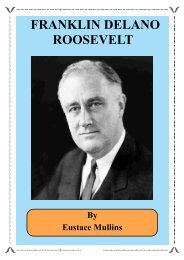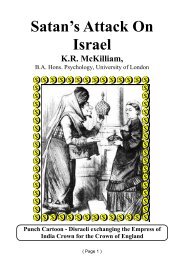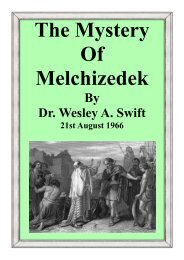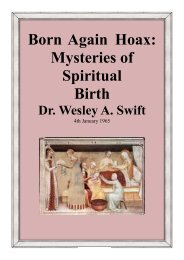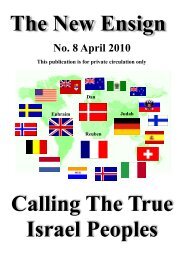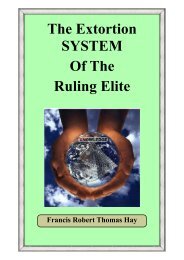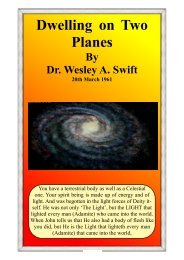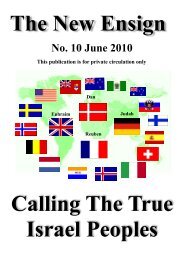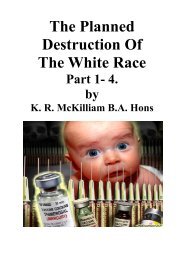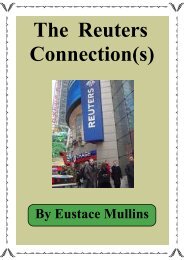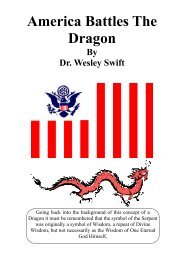Curse of Cannan - The New Ensign
Curse of Cannan - The New Ensign
Curse of Cannan - The New Ensign
You also want an ePaper? Increase the reach of your titles
YUMPU automatically turns print PDFs into web optimized ePapers that Google loves.
had followed the advice <strong>of</strong> these adepts, the expansion into Austria and Czechoslovakia, and the<br />
unexpectedly easy military successes in the first two years <strong>of</strong> World War II, which led them to<br />
their downfall. Whether Ostara actually is superior to Kabbalism and its other rivals may never<br />
be known, but whatever magical support Hitler and his circle may have been able to call upon,<br />
they were no match for the international organization <strong>of</strong> the Masonic Order <strong>of</strong> Canaanites. Hitler's<br />
greatest flaw was his lack <strong>of</strong> experience on a larger stage; it is doubtful if in his entire life he<br />
ever heard <strong>of</strong> the Canaanites. Both Hitler and Mussolini, early in their regimes, were quick to<br />
outlaw the Masons, failing to realize that Freemasonry and the Illuminati have always been<br />
underground movements. <strong>The</strong>y had been proscribed numerous times in numerous countries;<br />
these bans only gave greater encouragement to their furtive conspiracy. Neither Hitler nor<br />
Mussolini realized the awesome power <strong>of</strong> the "determined men <strong>of</strong> Masonry" who exercised total<br />
control over the "democratic" powers.<br />
Another considerable influence in the early days <strong>of</strong> the National Socialists was the Ariosophists,<br />
the Aryan branch <strong>of</strong> the <strong>The</strong>osophists. Based in Vienna, the Ariosophists exercised dramatic<br />
influence on Hitler's writings during his formative years. It is doubtful if he ever knew that<br />
<strong>The</strong>osophy was merely an extension <strong>of</strong> Kabbalism, or that he was involved with those whom he<br />
considered his sworn enemies.<br />
Once World War II had been satisfactorily launched, it seemed that nothing could stop Hitler's<br />
triumphant progression across the battlefields <strong>of</strong> Europe. He failed to realize that Napoleon had<br />
also strode victoriously over those same fields, only to die miserably <strong>of</strong> arsenic poisoning on a<br />
remote island. No one in Germany could see that this was merely Act One <strong>of</strong> a carefully staged<br />
drama. Act Two would open with the entry <strong>of</strong> the United States into the war, a possibility never<br />
envisioned by Hitler, and Act Three would be Gotterdammerung, the melodramatic immolation<br />
<strong>of</strong> Germany and Brunnhilde.<br />
Involving the United States in World War II was predicated on the successful operation <strong>of</strong> an<br />
end run play, which Hitler never considered. He had no intention <strong>of</strong> provoking the United States;<br />
when the British intelligence director, Sir William Stephenson, repeatedly murdered young<br />
German sailors on the streets <strong>of</strong> <strong>New</strong> York, the German government ignored the incidents.<br />
Despite the expenditure <strong>of</strong> millions <strong>of</strong> dollars on frenetic war propaganda, the American people<br />
remained insensitive to the "threat" <strong>of</strong> Nazism. Charles Lindbergh, Jr. led a nationwide "America<br />
First" campaign which seemed certain to keep us out <strong>of</strong> the war. <strong>The</strong> answer to the Roosevelt-<br />
Churchill dilemma was Pearl Harbour, one <strong>of</strong> the most artfully planned slaughters <strong>of</strong> American<br />
soldiers, sailors, and marines in our history. It seemed that everyone in a position <strong>of</strong> authority<br />
in London and Washington knew that the Japanese intended to attack Pearl Harbor, which was<br />
hardly surprising, because the Japanese secret codes had been broken months before. <strong>The</strong><br />
nightmare <strong>of</strong> the plotters was that the Japanese commanders might inadvertently find that their<br />
codes had been broken and call <strong>of</strong>f the attack on Pearl Harbor, since they would know that the<br />
defenders would be warned. <strong>The</strong> Washington conspirators, while breathlessly following the slow<br />
course <strong>of</strong> the Japanese fleet toward Pearl Harbor, avoided intimating to Kimmel and Short, the<br />
American commanders in Hawaii, that they were in any danger. Alerting them, <strong>of</strong> course, would<br />
warn the Japanese and cause them to turn back. <strong>The</strong> Japanese commanders later said that at the<br />
first sign <strong>of</strong> an alarm, they were prepared to turn back toward Tokyo without pressing their attack.<br />
A meeting <strong>of</strong> the conspirators at the White House on the evening <strong>of</strong> Pearl Harbor found them<br />
haggard with suspense; only a few more hours, and they would know whether they had "won,"<br />
that is, whether the Japanese would attack and destroy the American fleet and installations at<br />
Pearl Harbour. Never has any group waited for "bad news" with such intensity. President Franklin<br />
Delano Roosevelt, who lived throughout his life on handouts from his mother, the opium money<br />
amassed by her father, Warren Delano; Bernard Baruch, who had imposed the reparations debt<br />
upon Germany; General George Marshall, whom Senator McCarthy was later to call "a living<br />
lie"; these were the men who had staked everything on this gamble to involve the United States<br />
in World War II; if it failed, they had no backup plan. Hitler refused to pose any threat to the<br />
United States.<br />
( Page 103)



